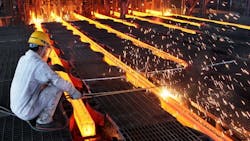Lawsuit Challenges Constitutionality of Steel Tariffs Statute
The American Institute for International Steel and two of its members filed suit Wednesday in the U.S. Court of International Trade challenging the constitutionality of the statute by which President Donald Trump imposed a 25% tariff on imported steel and a 10% tariff on aluminum imports earlier this year.
Those tariffs had generated $582 million from steel and $195 million from aluminum as of last week, according to the U.S. Commerce Department. More than 22,000 exclusions have been requested.
The lawsuit alleges that Section 232 of the Trade Expansion Act of 1962 violates the constitutional prohibition against Congress delegating its legislative powers to the president because it lacks any “intelligible principle” to limit the president’s discretion.
“Congress has abdicated” its responsibility, said Alan Morrison, lead counsel for the plaintiffs, in a press conference held Wednesday morning.
The lawsuit also alleges the statute violates the constitutional doctrine of separation of powers and the associated system of checks and balances.
The AIIS describes itself as the “leading voice for the steel supply chain" and says its more than 100 members rely on imported steel for their economic well-being. Those members, most of which are not publicly listed, include railroads and other transportation companies, importers, shippers, ports, and union locals. Union Pacific Railroad, Port Houston and Clipper Steel Services are among the members.
The two institute members that have joined AIIS in the lawsuit are Sim-tex, a Waller, Texas-based importer and wholesaler of steel pipe and tube products used in the oil and gas industries; and Kurt Orban Partners, a specialty steel trader based in Burlingame, Calif.
What the Lawsuit Seeks
The lawsuit seeks to have Section 232 declared unconstitutional, as well as a court order preventing further enforcement of the 25% tariff.
No companies representing the aluminum industry are part of the lawsuit – “it is complicated enough,” Morrison said – but suggested that aluminum tariffs would fall as well if the suit were successful.
The plaintiffs have requested a three-judge court. They are not seeking a preliminary injunction.
No monetary damages are requested.
In terms of timing, “Ideally, we would like to have this done and decided by Labor Day,” Morrison said, noting that scheduling is up to the court.
About the Author
Jill Jusko
Bio: Jill Jusko is executive editor for IndustryWeek. She has been writing about manufacturing operations leadership for more than 20 years. Her coverage spotlights companies that are in pursuit of world-class results in quality, productivity, cost and other benchmarks by implementing the latest continuous improvement and lean/Six-Sigma strategies. Jill also coordinates IndustryWeek’s Best Plants Awards Program, which annually salutes the leading manufacturing facilities in North America.
Have a story idea? Send it to [email protected].

